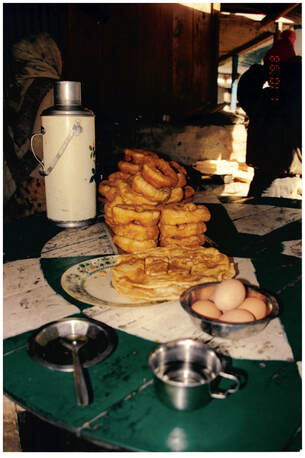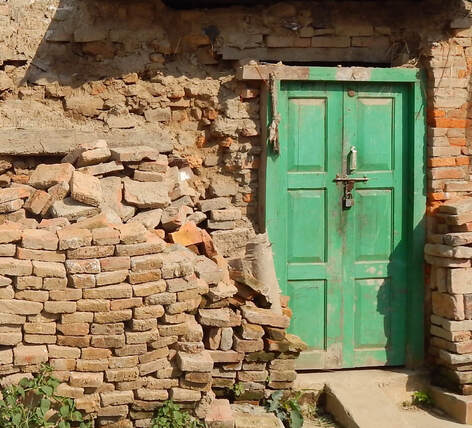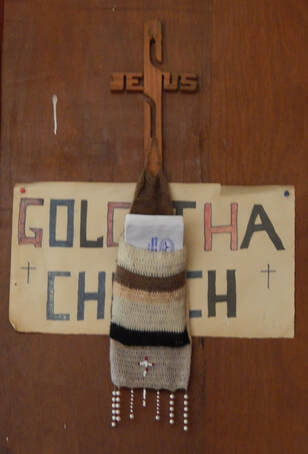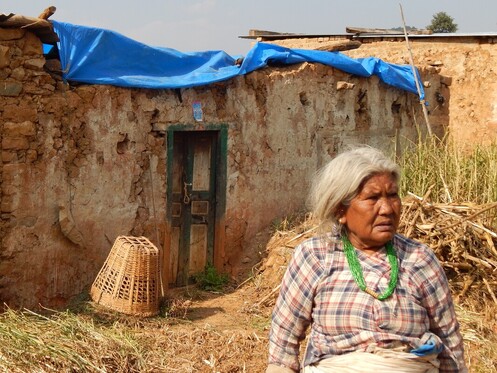|
Today we are making available the next installment of our new online video series for Economics in the Gospels.  An awful lot of food is found in the Gospels. Lots of bread especially and mention of the raw materials needed to produce it. In fact, we can see a thriving agricultural component that includes the fields, yeast, wheat, eggs, etc. Same for wine with mentions of vineyards, winepresses, etc. We also see big feasts and extravagant weddings where food have been front and center, not unlike today. Throw in fish and figs and we see a pretty good diet with no mention of famine or much hunger, aside from that of followers who traveled to see Jesus preach. Then we see the most poignant instances of food in the Gospels where we see Him feeding thousands from a few fish and loaves of bread. Most importantly perhaps is the Transubstantiation of Christ’s body and blood into bread and wine that Christians practice to this day - a communion through food that is shared across time from the Last Supper. The most fundamental factor of a civilization’s economy is arguably its food production and the ability to organize themselves, their land, and other required resources. To produce food in abundance fields, sowers, seed, soil, fertilizer, beasts of burden, etc., are needed. Taken together with the jobs, and the agricultural related structures mentioned previously, we see that agriculture may well be considered the largest component of the Gospel economy. Food is probably the most talked about thing in the Gospels, in one way or another. It is used as a metaphor for the metaphysical; it is used in the parables over and over and over; it is featured in many of the miracle recounts; it is used in the last supper; it is used to demonstrate mercy. Fish are probably the most famous foodstuff of the Gospels, after bread. Many of the disciples were fishermen, fish were the food of choice in the miracle feedings, and even the symbol for Jesus himself was a fish. Luke 24:41 And while they still could not believe it (because of their joy) and were amazed, he said to them, “Do you have anything here to eat?” 24:42 So they gave him a piece of broiled fish, Bread holds especially significant importance as the preeminent food. It is featured in iconic prayers… Matthew 6:11 Give us today our daily bread, And Jesus even refers to himself as bread … John 6:51 I am the living bread that came down from heaven. If anyone eats from this bread he will live forever. The bread that I will give for the life of the world is my flesh.” Wheat, being the primary raw material for bread receives many mentions in the Gospels. Wheat is featured in the parables and in the story about Jesus and his disciples as they walk through a field. We find mentions of grain, barley, yeast, and flour. We also find mint, dill, cumin, olive oil, spices, and salt, and in one of the most famous parables the tiny mustard seed plays a big role. All this agriculture requires labor as we found in the chapter on labor, and here in the term sower. The word sow and sowing is one of the most often used words in the Gospels and found almost entirely in the parables. The concept of sowing is analogous to what Jesus and God are apparently trying to do with mankind. It points to the preferred method of talking to people in terms they can understand, yet again, with an agricultural tie-in. John 4:36 The one who reaps receives pay and gathers fruit for eternal life, so that the one who sows and the one who reaps can rejoice together. 4:37 For in this instance the saying is true, ‘One sows and another reaps.’ Weeds play the villain in the Gospels, to be uprooted and destroyed – and presumably, never overcome. Matthew 13:38 The field is the world and the good seed are the people of the kingdom. The weeds are the people of the evil one… The fruit mentioned most in the Gospels is the fig. Grapes are close, especially if one counts wine and allusions to “fruit of the vine”. Matthew 21:19 After noticing a fig tree by the road he went to it but found nothing on it except leaves. He said to it, “Never again will there be fruit from you!” And the fig tree withered at once. In a specific economic context, there was obviously a great deal of wine production. As mentioned previously, it must have contributed appreciably to the overall GDP of its day. We can see references to vineyards throughout the parables and mentions of vines, grapes, wineskins, winepress, etc. Intriguingly, John the Baptist supposedly never touched the stuff: A cleared field is vital to agriculture, but in many ways is a blank slate, waiting to be planted, taken care of, and finally harvested. In the Gospels fields are used sometimes as a metaphor for the world. But fields are sometimes just fields – something to walk through and grow crops in. Luke 6:1 Jesus was going through the grain fields on a Sabbath, and his disciples picked some heads of wheat, rubbed them in their hands, and ate them. Not surprisingly we find instances of fertilizer and manure piles. We also see beasts of burden like oxen, donkeys, and various livestock, such as when we see a “Hen gathers her chicks” and roosters mentioned. Pigs seem to hold a particularly curious place in the Gospels as a host demons apparently prefer, if they can’t get a person. There is no more ubiquitous animal in the Gospels than sheep. Sheep are the ultimate metaphor for people and demonstrates our relative position nicely. It is also important to remember who the shepherd is in these passages. The most vulnerable of all is the lamb, used by Jesus to refer to the disciples, and is a metaphor for Jesus himself. John the Baptist refers to Jesus as “the Lamb of God”. For more information about the course click here. To view the video click here. For the study text click here. Next up: Offering/Gifts/Taxes/Rich & Poor
0 Comments
 Today we are making available the next installment of our new online video series for Economics in the Gospels. There are many references to boats in the Gospels. From those used by disciple-fishermen, to those used for transportation, boats are mentioned throughout. In fact, there are no other modes of transportation mentioned in the Gospels, at least not that Jesus or his followers used – aside from their feet, of course. Jesus and His disciples used boats regularly, sometimes to get away from the crowds. Matthew 14:13 Now when Jesus heard this he went away from there privately in a boat to an isolated place. But when the crowd heard about it, they followed him on foot from the towns. Walking on water without the boat? Quelling the sea from dry land? These are miracle stories which would be difficult to imagine without the boats. The Gospels also include mention of a significant number of goods produced in what one might term the light manufacturing of its day. These items represent jobs and businesses just like today and there’s a wide variety, from flasks to nails, thrones to dice, even stretchers. This list of products is a good start on the essential items a society needs to function. When added to the services/labor listed previously, and the construction activity evidenced as well, a picture of the Gospel economy emerges. These items seem innocuous though all of them play important roles in the Gospel stories. For instance, John the Baptist’s story would not be complete without a platter for his head. But this is just one of many items we might find in today’s kitchen like jars, cups, plates, pots, kettles, bowls, and sponges. Other household items like beds, baskets, books, mats, keys, cushions, tables, lamps, washbasins, seats, even a furnace may be found. On farms and in the vineyards we might find a yoke, plow, fences, pits, winepresses, watchtowers, and millstones. In the synagogues we might find scrolls, an altar, offering boxes, and incense. Fishermen would need the hooks and nets, and, of course, the boats mentioned previously. Music would have flowed from the flutes and trumpets. Personal items like money and traveler’s bags; purses for their beautiful stones and pearl; and the Treasure/Gold/Money cited earlier in the study. Lastly, weapons and other potentially violent objects are given their own short chapter in the study. There really aren’t a lot of mentions given the violent scenes that pepper the Gospel texts, though well represented they are. How else could it be in a depiction of Roman times – or our own today? What do we find? Lanterns, torches, and weapons are combined in one mention, chains and shackles in another. Armor, swords, clubs, axes, and spears are found as well. Interestingly, there are no mentions of knives. For more information about the course click here. To view the video click here. For the study text click here. Next up: Feasts, Food and Agriculture, Bread and Wine After five years it seems that we have outgrown our old mission statement as well as the description of what we are about - and while we were at it, Managing Director Steve Richards' bio got an overhaul as well. Mission Statement TheoEco documents and brings to light ecological and human rights struggles, while researching the economic and theological entanglements that influence them, particularly in the United States, Nepal, and other regions with celebrated environmental importance. For more click here.
 Today we are making available the next installment of our new online video series for Economics in the Gospels. Dwellings and Other Structures The Gospels are full of houses. They are mentioned seemingly at all times and in all books. The disciples had them. Jesus’ friends had them, as did his enemies. Everyone but Jesus himself seemed to have one. John 7:53 And each one departed to his own house. From an economics standpoint it would seem pretty obvious that homebuilding, like today, was a cornerstone of economic activity. As is seen in the chapters on labor and produced goods it is also apparent that tools and jobs were abundant in the home building sector, if you will. Houses are also mentioned metaphorically time and again in the Gospels as in this famous passage: Matthew 12:25 Now when Jesus realized what they were thinking, he said to them, “Every kingdom divided against itself is destroyed, and no town or house divided against itself will stand. The temple in Jerusalem was in many ways the focal point of the Gospels in terms of a center of gravity, so to speak. From an economic and architectural point of view it would be hard to top in significance. This well-known entry is found when Jesus is turning over the tables of the money changers – He speaks of the temple as His Father’s house. Mark 11:17 Then he began to teach them and said, “Is it not written: ‘My house will be called a house of prayer for all nations’? But you have turned it into a den of robbers!” Here Jesus talks about His Father’s actual heavenly house. John 14:2 There are many dwelling places in my Father’s house. Otherwise, I would have told you, because I am going away to make ready a place for you. In this incident Jesus visits the disciples in a house where He apparently goes through the walls after the resurrection. Again, houses are the scene of many key moments and larger than life events. John 20:26 Eight days later the disciples were again together in the house, and Thomas was with them. Although the doors were locked, Jesus came and stood among them and said, “Peace be with you!” But apparently, Jesus himself had no house of his own. Luke 9:58 Jesus said to him, “Foxes have dens and the birds in the sky have nests, but the Son of Man has no place to lay his head.” In addition to housing, there was a lot of other building going on back in the day of the Gospels. Synagogues, tombs, prisons, barns – there’s quite a list. Along with agriculture, textiles, and what we might term today, light industry, it appears that construction was the chief component of economic activity. For instance, much of the Gospels’ action took place in, and through, the synagogues. Jesus was a regular worshiper and teacher. One can almost see Jesus reading at the service, like lay people do today in a reading from the Bible at a Sunday service. Luke 4:16 Now Jesus came to Nazareth, where he had been brought up, and went into the synagogue on the Sabbath day, as was his custom. He stood up to read, Lastly, perhaps the most famous structures in the Gospels are the manger and inn… Luke 2:7 …and laid him in a manger, because there was no place for them in the inn. The Gospels are full of houses. They are mentioned seemingly at all times and in all books. The disciples had them. Jesus’ friends had them, as did his enemies. Everyone but Jesus himself seemed to have one. John 7:53 And each one departed to his own house. From an economics standpoint it would seem pretty obvious that homebuilding, like today, was a cornerstone of economic activity. As is seen in the chapters on labor and produced goods it is also apparent that tools and jobs were abundant in the home building sector, if you will. Houses are also mentioned metaphorically time and again in the Gospels as in this famous passage: Matthew 12:25 Now when Jesus realized what they were thinking, he said to them, “Every kingdom divided against itself is destroyed, and no town or house divided against itself will stand. The temple in Jerusalem was in many ways the focal point of the Gospels in terms of a center of gravity, so to speak. From an economic and architectural point of view it would be hard to top in significance. This well-known entry is found when Jesus is turning over the tables of the money changers – He speaks of the temple as His Father’s house. Mark 11:17 Then he began to teach them and said, “Is it not written: ‘My house will be called a house of prayer for all nations’? But you have turned it into a den of robbers!” Here Jesus talks about His Father’s actual heavenly house. John 14:2 There are many dwelling places in my Father’s house. Otherwise, I would have told you, because I am going away to make ready a place for you. In this incident Jesus visits the disciples in a house where He apparently goes through the walls after the resurrection. Again, houses are the scene of many key moments and larger than life events. John 20:26 Eight days later the disciples were again together in the house, and Thomas was with them. Although the doors were locked, Jesus came and stood among them and said, “Peace be with you!” But apparently, Jesus himself had no house of his own. Luke 9:58 Jesus said to him, “Foxes have dens and the birds in the sky have nests, but the Son of Man has no place to lay his head.” In addition to housing, there was a lot of other building going on back in the day of the Gospels. Synagogues, tombs, prisons, barns – there’s quite a list. Along with agriculture, textiles, and what we might term today, light industry, it appears that construction was the chief component of economic activity. For instance, much of the Gospels’ action took place in, and through, the synagogues. Jesus was a regular worshiper and teacher. One can almost see Jesus reading at the service, like lay people do today in a reading from the Bible at a Sunday service. Luke 4:16 Now Jesus came to Nazareth, where he had been brought up, and went into the synagogue on the Sabbath day, as was his custom. He stood up to read, Lastly, perhaps the most famous structures in the Gospels are the manger and inn… Luke 2:7 …and laid him in a manger, because there was no place for them in the inn. Next up: Boats, Manufactured Goods, Arms and Sharp Objects For more information about the course click here. To view the video click here. For the study text click here.  Today we are making available the next installment of our new online video series for Economics in the Gospels. Commerce, Banking, and Forgiveness Without credit and debt, the modern economic system would be unrecognizable. Not surprisingly, borrowing and lending are well represented in the Gospels as well: Luke 6:35 But love your enemies, and do good, and lend, expecting nothing back… The Gospels’ texts would put the world economic system on its head if followed to the letter. Lend and expect nothing back? Not likely. Here’s an intriguing take on who lends money to whom: Luke 6:34 And if you lend to those from whom you hope to be repaid, what credit is that to you? Even sinners lend to sinners, so that they may be repaid in full. Banking and forgiveness go hand in hand, sort of. Matthew 6:12 and forgive us our debts, as we ourselves have forgiven our debtors. A quaint concept with little relevance in today’s world? Not really. Forgiveness of debts is commonplace, as well as the pragmatic practice of companies and individuals “wiping the slate clean” after lawsuits and civil proceedings are settled. Lawsuit today – partnership tomorrow. What else is a creditor to do? There used to be debtor’s prisons back in Dickens’ day, but no more. Instead, you get imprisoned by your credit rating, debt collectors, and perhaps bankruptcy proceedings - but eventually they forgive, or at least give up. Few economic entities take things personally. It is also normal for large economic enterprises, even countries, to turn the other cheek, so long as there are economic payoffs. And if they don’t? If we don’t? Here the Gospels put some meat on the bones regarding the requirement to forgive. Matthew 6:14 “For if you forgive others their sins, your heavenly Father will also forgive you. 6:15 But if you do not forgive others, your Father will not forgive you your sins. Apparently, forgive or else? For more information about the course click here. To view the video click here. For the study text click here. Next up: Dwellings Other Structures  So then, don’t worry saying, ‘What will we eat?’ or ‘What will we drink?’ or ‘What will we wear?’ - Matthew 6:31 Don’t worry!? What a thing to say with so much to worry about, especially with the Covid-19 pandemic. Here’s just a sample of things I have personally worried about in the past 24 hours: the economy, my daughter, my mom, myself, the elections, vaccines, masks, the list goes on. But my list is one of someone truly blessed. I’m one of the fortunate that doesn’t have to worry about food, rent/mortgage, unemployment benefits, illness, a job…the list is long, so long, for so many. Apparently though, worry is part of the human condition. It is built into the DNA. So, what was Jesus thinking when he said this: Luke 12:29 So do not be overly concerned about what you will eat and what you will drink, and do not worry about such things. 12:30 For all the nations of the world pursue these things, and your Father knows that you need them. 21:34 “But be on your guard so that your hearts are not weighed down with dissipation and drunkenness and the worries of this life, and that day close down upon you suddenly like a trap. Or this? Matthew 6:25 “Therefore I tell you, do not worry about your life, what you will eat or drink, or about your body, what you will wear. Isn’t there more to life than food and more to the body than clothing? I suppose there’s a bit of a silver lining in not being able to send the kids back to school; parents don’t have to worry about getting new back to school clothes! Not so positive if you make, sell, or transport such things. Interestingly, one of the first mentions of clothes in the Gospels is the suggestion not to worry about them: Matthew 6:28 Why do you worry about clothing? Think about how the flowers of the field grow; they do not work or spin. Not worrying is perhaps the hardest instruction of all. Even if we are assured of how little we have to worry about: Luke 12:6 Aren’t five sparrows sold for two pennies? Yet not one of them is forgotten before God. 12:7 In fact, even the hairs on your head are all numbered. Do not be afraid; you are more valuable than many sparrows. We can assume though that Christ knew what he was talking about. Who had more to worry about than Him? Heck he didn’t even have a place to lay his head: Luke 9:58 Jesus said to him, “Foxes have dens and the birds in the sky have nests, but the Son of Man has no place to lay his head.” So, how does He suggest we handle the worries of life? Apparently, taking things a day at a time helps as He tells us here: Matthew 6:34 So then, do not worry about tomorrow, for tomorrow will worry about itself. Today has enough trouble of its own.. And in this most famous of prayers He incapsulates the whole idea: Matthew 6:11 Give us today our daily bread… Not tomorrow’s bread, just today's. It is very hard to trust that we are taken care of, that we don’t have to worry so much. In the end, it seems to be about faith...  Today we are making available the next installment of our new online video series for Economics in the Gospels. Management (Jesus’s Instructions) Jesus a manager? It seems a bit presumptuous to think that we can relate to such a divine figure in such a human way, but that’s what the Trinity invites us to do - remember that Jesus was an actual human being. As such, we can look upon Him in that context, which is what the Economics in the Gospels study is all about. We see managers throughout the Gospels and even Jesus acting as one. He is definitely the boss of his group, the disciples, and what was becoming a significant movement: His flock. They used money and paid for things. They don’t appear to depend on miracles to get their daily bread, and aside from the four-drachma coin, didn’t create cash from thin air. So, let’s assume they organized their affairs to travel, eat, etc., like most anybody else. The purpose of this chapter is not to moralize about the directions Jesus gives. Most of us will at least pay lip service to how nice things would be if we did what He instructs. The bigger issue in an economics context is to try to imagine how much our economic and financial systems would be impacted if we did. In many ways, this is probably the “toughest” section of the study as it contains the unvarnished instructions of the Lord. It should be no surprise then that the words are often difficult, even impossible for most of us to live by. For instance, how many believers today are ready to emulate his instructions to a rich man: Luke 18:18 Now a certain ruler asked him, “Good teacher, what must I do to inherit eternal life?” 18:19 Jesus said to him, “Why do you call me good? No one is good except God alone. 18:20 You know the commandments: ‘Do not commit adultery, do not murder, do not steal, do not give false testimony, honor your father and mother.’” 18:21 The man replied, “I have wholeheartedly obeyed all these laws since my youth.” 18:22 When Jesus heard this, he said to him, “One thing you still lack. Sell all that you have and give the money to the poor, and you will have treasure in heaven. Then come, follow me.” 18:23 But when the man heard this he became very sad, for he was extremely wealthy. 18:24 When Jesus noticed this, he said, “How hard it is for the rich to enter the kingdom of God! 18:25 In fact, it is easier for a camel to go through the eye of a needle than for a rich person to enter the kingdom of God.” 18:26 Those who heard this said, “Then who can be saved?” 18:27 He replied, “What is impossible for mere humans is possible for God.” 18:28 And Peter said, “Look, we have left everything we own to follow you!” 18:29 Then Jesus said to them, “I tell you the truth, there is no one who has left home or wife or brothers or parents or children for the sake of God’s kingdom 18:30 who will not receive many times more in this age – and in the age to come, eternal life.” We have developed two thousand years of theology to argue that Christ didn’t really mean this. Sell everything and give the money away? Again, we find a pretty unpromising Capitalist in Jesus. I’m afraid most of us will simply need to hope He either didn’t mean it or that we will be forgiven for not, or that he actually didn’t mean quite what He said. Maybe He just meant it for this one particular guy? Hauntingly (for me anyway), this isn’t Jesus talking in enigmatic parables but a plain-spoken direct answer to a question. One thing’s for sure, our economic system will not withstand everybody following this path. There are many other directives given by Christ in this chapter, economically speaking, about how to live in this world, much of which would turn our financial world upside-down. Next up: Commerce/Banking/Forgiveness
For more information about the course click here. To view the video click here. For the study text click here. |
Archives
June 2024
Categories
All
|
TheoEco Institute is a 501(c)(3) nonprofit organization. Contributions to TheoEco in the United States are tax exempt to the extent provided by law.

 RSS Feed
RSS Feed